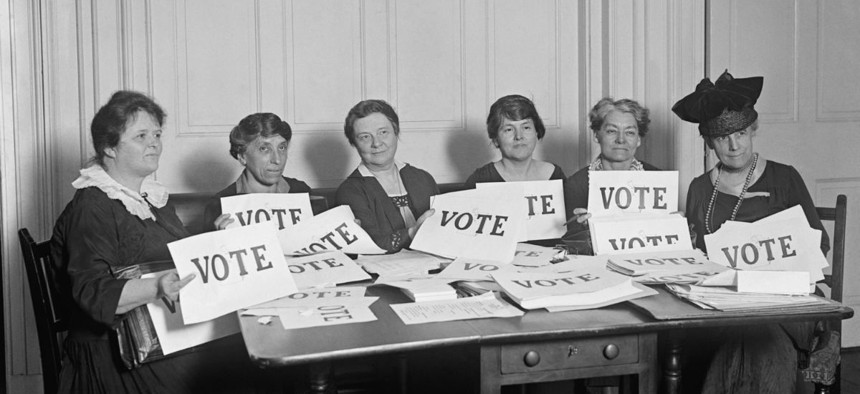
National League of Women Voters hold up signs reading, 'VOTE', Sept. 17, 1924. Millions of women voted in 1920 and 1924, but in a lower proportion than men. Shutterstock.com
What Women’s Suffrage Tells Us About Empowerment
Not all women benefited equally from the law Congress passed 100 years ago today.
One hundred years ago today, following decades of delay, Congress approved the 19th Amendment to the U.S. Constitution, which guaranteed women the right to vote. The Amendment was finally ratified by three-fourths of the states in August 1920, after a tough fight that ended only after one legislator in the last state of Tennessee switched his vote to support women’s suffrage. This victory marked the end of a 72-year struggle to guarantee women a constitutional right to vote and participate in our democratic system. The fight for women’s suffrage offers many important lessons still applicable today.
With the passage of the 19th Amendment, half of the adult American population was enfranchised on a single day, and in doing so, women were explicitly incorporated into the U.S. Constitution for the first time. Suffrage history is a compelling story about generations of suffragists’ fight to win the political power needed to improve their own lives. However, not all women participated or benefited equally. In the years that followed, the fundamental right to vote was abridged by laws that discriminated and limited the franchise.
Few Americans today would argue that women should not have a constitutional right to vote. But the purpose of commemorating the 19th Amendment centennial is to increase our understanding of what it took to win that right and what can be learned from that struggle that applies not only to women, but also to other groups today that feel disempowered. When combined with the impact of the 15th Amendment, granting African-American men the right to vote in 1870, and the Voting Rights Act of 1965, this anniversary of the 19th Amendment reminds us of the privilege and the power that come with active participation through voting in our democracy.
Participating in the democratic process is fundamental to building trust in the outcomes of that process. And yet, in America today, we have a crisis in both trust and in participation. According to the Pew Research Center’s 2019 National Election Study report, “Only 17% of Americans today say they can trust the government in Washington to do what is right ‘just about always’ (3%) or ‘most of the time’ (14%).” Pew also reported that just 56% of the U.S.-voting age population cast ballots in the 2016 presidential election, one of the lowest rates among developed countries.
Daily news headlines reinforce concerns about the integrity of our voting processes and systems, as we learn of foreign influence in our elections, faulty efforts to purge voter rolls, and gerrymandered districts that have institutionalized political polarization. At a time when we desperately need more voter participation and more trust in government, we are faced with less of each.
Public administrators are well positioned to promote policies that increase citizen engagement today. Despite the lack of trust in the federal government found by Pew, Gallup's annual governance poll, conducted September 4-12, 2018, found that 72% of American adults say they have a "great deal" or a "fair amount" of trust in their local government.
Consequently, local civic leaders can be extraordinarily influential in addressing the forces that reduce voter participation and trust. It took 72 years of advocacy to obtain the women’s vote. Many of the roadblocks stemmed from the role of money and special interests—factors in play today. But elections are run at the local level, where local leaders can work to promote civility, transparency and equity in the process and political discourse.
Local excellence, however, will not resolve our trust and participation deficits at the federal level. That will require concerted national efforts. The U.S. Supreme Court has recently heard arguments regarding partisan gerrymandering in Maryland, North Carolina, and stayed court rulings in Michigan and Ohio. Several federal and many state agencies have increased their efforts to protect our elections from outside forces. Polls indicate a renewed interest in national politics across all demographic groups that could improve participation in the 2020 election. And this will be facilitated by organizations like the League of Women Voters, founded by the suffragists themselves, which work tirelessly to ensure voter registration and turnout and to fight against voter disenfranchisement.
Whatever our differences, we all have a stake in promoting good government. We all benefit when government works effectively and efficiently and when everyone has a voice. The centennial anniversary of women’s suffrage is the perfect time to reflect on this extraordinary accomplishment and to renew our commitment to exercise our hard-won right to help shape the future of our democracy.
Nancy Tate, former Executive Director of the League of Women Voters, leads the 2020 Women’s Vote Centennial Initiative and is a Fellow of the National Academy of Public Administration. Terry Gerton is President and CEO of the National Academy of Public Administration.






